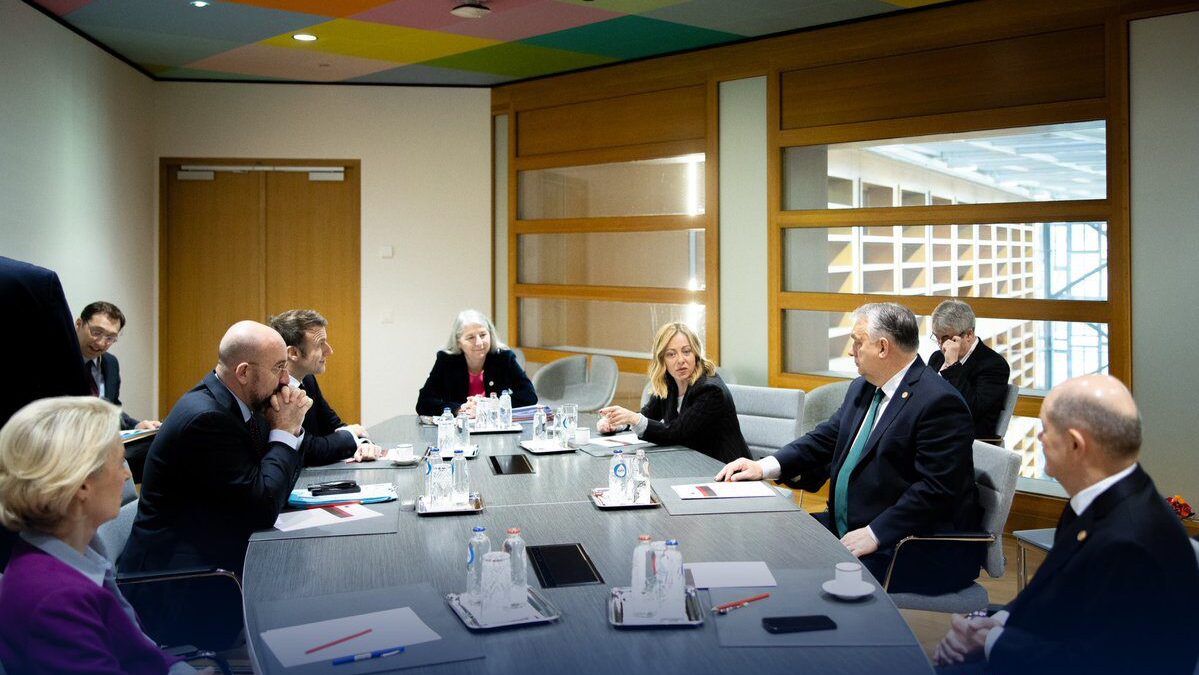
Hungarian PM Viktor Orbán (second from right) having pre-summit negotiations with Commission President Ursula von der Leyen, European Council President Charles Michel, French President Emanuel Macron, Italian PM Giorgia Meloni, and German Chancellor Olaf Scholz.
Photo: @PM_ViktorOrban on X/Twitter, 1 February 2024.
As angry farmers blockaded the entire EU district in Brussels with hundreds of tractors, many of the EU leaders were forced to arrive at the Council building on foot. Yet, despite the raging protest outside, the only thing on everyone’s mind before the summit was the Ukraine Facility, the multi-annual aid package totalling €50 billion.
As 26 of the 27 member states’ government leaders already agreed on the instrument being financed from an increased EU budget back in December, the sole objective for Thursday’s European Council (EUCO) summit was to convince Hungary’s PM Viktor Orbán to drop his veto as well.
In recent weeks, Orbán made it clear that he only supports the joint EU aid if there’s an annual review of how Kyiv’s spending the funds, or, alternatively, he’d let the other leaders set up an extra-budgetary mechanism based on voluntary participation to keep financing Ukraine.
Based on the doorstep interviews, most leaders anticipated a long and hard battle that could drag on until the night, but that’s not what happened. Just minutes into the summit, European Council President Charles Michel announced on X that the agreement was reached with all member states, meaning that the chamber was able to persuade Orbán to drop his veto.
“We have a deal. All 27 leaders agreed on an additional €50 billion support package for Ukraine within the EU budget,” Michel wrote. “This locks in a steadfast, long-term, predictable funding for Ukraine.”
The reason for the unusually swift conclusion was that several EU leaders held a preliminary closed-door meeting with Orbán ahead of the summit, including Michel, Commission President Ursula von der Leyen, as well as the heads of Germany, France, and Italy.
Casual morning conversation before the #EUCO with @EmmanuelMacron @GiorgiaMeloni @Bundeskanzler @CharlesMichel and @vonderleyen . pic.twitter.com/eTnUH2jpcN
— Orbán Viktor (@PM_ViktorOrban) February 1, 2024
It was presumably during that morning meeting that all sides came to agree on what concessions to offer to Hungary. According to diplomats familiar with the draft conclusions, Orbán agreed to the four-year-long financing instrument with three additions:
In addition, EU leaders agreed to include a line in conclusions guaranteeing that the way the rule of law in Hungary is evaluated by the Commission will be done in good faith. Specifically, the text stresses that the Commission should always be “objective, fair, impartial, and fact-based” and guarantee “non-discrimination” whenever the conditionality mechanism to block EU funds to any capital is triggered.
🇭🇺@PM_ViktorOrban: We’ve stood our ground, and after long negotiations, we have accepted the EU’s offer! pic.twitter.com/YyUU6s8f3A
— Zoltan Kovacs (@zoltanspox) February 1, 2024
Although it seems symbolic, this last concession was seen as crucial to “rebuilding trust” between Budapest and the European Commission president, who—according to Fidesz lawmakers—has essentially admitted that Hungary was being attacked because of its tough political stance on migration and LGBTQ issues.
Whether the Commission will start treating Hungary “fairly” from now on remains to be seen, but at least Budapest will have a written guarantee to show whenever it faces political persecution.
.@BalazsHidveghi: #Hungary🇭🇺 can't compromise on #gender and #migration, because no money is more valuable than to protect children and national identity.
— The European Conservative (@EuroConOfficial) January 25, 2024
Stay tuned for the release of the latest episode of our news show on the EU's #RuleOfLaw hypocrisy! #InsideBrussels pic.twitter.com/287tTZIbK4
